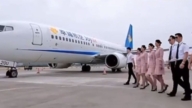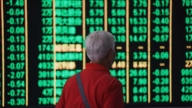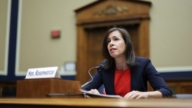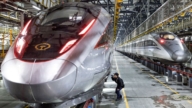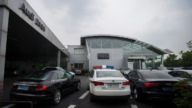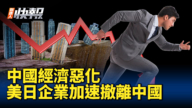【新唐人2012年7月17日讯】14号下午,中共总理温家宝在成都主持召开河南、湖南、广西、四川、陕西五省区负责人经济形势座谈会。在会上,温家宝这个月第二次对中国经济下行发出警告。
温家宝表示,当前经济还没有形成稳定回升态势,经济困难可能还会持续一段时间。
北京师范大学MBA导师段绍译分析,中国未来几年的经济发展受到四个方面制约,可能很难赶上过去十年。
北京师范大学MBA导师段绍译:“第一方面,就是中国的房地产泡沫现在非常的严重;第二点,就是国进民退,国有企业现在越来越强势,这个民营企业越来越难做;第三方面,就是美国的次贷危机,加上欧洲的经济不景气,都影响到中国的出口;还有第四点,就是中国的金融业不发达,大量的民营企业根本就借不到银行的钱。”
国家统计局上星期五(7月13号)公布的数据显示,中国第二季度经济增速降到7.6%,创下三年多来的新低。另外中国海关的统计数字显示,今年6月中国的进出口与上个月相比分别都有所减少,特别是进口方面减少了8.9%,显示中国国内对海外石油等燃料和原材料的需求进一步减少。
尽管如此,温家宝表示,目前,经济增速仍在年初确定的预期目标区间内,稳增长政策措施正在见到成效。
对此,政治经济评论家草庵指出,由于中共建政以来一直只讲好不讲坏,隐瞒真正的事实,所以很多西方学者已经把温家宝最近两次讲的“经济大体稳定,有下行压力”,看做自1978年邓小平讲“中国走向经济崩溃的边缘”以来,中共就经济状况第二次严重的讲话。
草庵:“中国经济状况远比中共对外公开的更加严重。而且整个经济恶化的程度也是要严重的多。其实这反映一个问题是,温家宝的讲话,实际上是在从侧面用婉转隐晦的方式,表明中国经济已经出现了一个不可逆转的一个下行的一个趋势。”
海外媒体评论,现在这个经济放缓的时间点对于中共特别尴尬,因为在十八大权力交接之前,中共正在激烈的内斗中试图保持稳定,而中国的失业侵蚀了经济增长,削弱了共产党权力合法性,更多的失业将点燃民众对利益阶层的仇富情绪,增加政治变革的压力。
草庵:“最近几十年来中共就讲一个道理,就是说,我们执政没有经过选举好像是不合法,但是我们在执政过程当中一直是经济得到了发展,经济发展就成为中共执政的一个依据。如果经济上出现了问题的话,这个中共执政的合法性就受到了更大的质疑。”
英国《金融时报》中文网专栏作家徐瑾撰文表示,今年初中共政府的过度乐观,导致了经济政策继续从紧,没能及时掉头,随后形势急转直下,又导致货币政策急促应对。当下的数据显示出,政策应当做出调整,而不完全是经济全面企稳的信号。
徐瑾认为,中国经济着陆已经没有悬念,只是在着陆方式和重启模式上存在争议。她指出,中国企业实际上也和美国企业一样,具有自我修复能力,但恰恰是因为政府之手“过分好动”,才造成了中国企业自我修复能力变弱,经济依赖于政府启动投资。
采访/常春 编辑/尚燕 后制/柏妮
China Premier Wen Jiabo’s Economic Warning
On July 14, the Premier Wen Jiabao chaired an economic
meeting in Chengdu, attended by leaders from Henan, Hunan,
Guangxi, Sichuan and Shaanxi provinces.
During the meeting, Wen issued this month’s 2nd warning
about China’s economic drop.
Wen said that China’s economic rebound was not yet stable
and economic hardship could continue for a period of time.
Duan Shaoyi, Beijing Normal University lecturer, analyzed
that China’s economic development in the next few years
would be limited by four aspects and that it would be hard
to beat the last decade’s development.
[Duan Shaoyi, Beijing Normal University lecturer]:
“Firstly, China’s property bubble is now very serious.
Secondly, state-owned enterprises are increasingly stronger
and have developed well, but not private businesses,
which are becoming more difficult to develop.
Thirdly, the US sub-prime mortgage crisis and European
economic recession has affected China’s exportation.
Forthly, China’s financial sector is underdeveloped,
so private enterprises cannot get their funding from banks.”
July 13—the National Statistic Bureau released data showing
that China’s second-quarter economic growth had fallen to a 3-year low of 7.6%.
In addition, China’s Customs Statistics shows that import and
export figures had both decreased compared to June, with the import rate falling by 8.9%.
The fall in figures indicate a drop in China’s domestic demand
for the import for oil, energy and raw materials.
However, Wen Jiabao claims that, currently, the economic
growth rate is still within the target range set early this year and stabilization policies were taking effect.
Regarding Wen’s remark, Cao An, political and economic
commentator, tells a different story.
Cao An says that the Chinese Communist Party (CCP) has
always publicized the positive aspects of China’s economy
but has never mentioned the negative aspects, and that
the CCP have covered up the truth.
Many western scholars consider Wen’s remarks that the
“economy remains stable yet faces huge downward pressure”
as the most serious statement since Deng Xiaoping’s remarks
in 1978 that “China walks to the edge of economic collapse”.
[Cao An]: “The economic reality is much worse than
is publicized and the entire situation is more serious.
Actually, Wen’s remarks indirectly reflect that China’s
economic trend is taking an irreversible downslide.”
Overseas media commented that the timing of the latest
slowdown was especially awkward for the CCP,
who were trying to enforce calm, ahead of its handover of
power before the 18th Congress.
Job losses are eroding China’s economic gains, which are
what underpin the CCP’s claim to power.
More Job losses could fuel sentiments, adding to increased
pressure for political change.
[Cao An, political and economic commentator]:
“The CCP has talked about one issue for a few decades.
The CCP claims its power without an election, but during its
ruling period, the development of China’s economy has become a support of their claim.
If the economy faces a problem, the CCP’s legitimacy
will be widely doubted.”
Xu Jin, a Chinese Financial Times columnist says,
the CCP was over optimistic at the beginning of 2012.
The economic policy was tightened and the CCP failed to
adjust it in time, so later the situation became worse,
and lead to an emergency adjustment of the monetary policy.
The current situation and data indicates that it’s time to
adjust policies, rather than signaling stability.
Xu Jin believes that there is no doubt for China’s economic
landing, but some argument about methods exist.
Xu points out that there are no differences between Chinese
and U.S. enterprises—both have the ability for self-repair.
The Chinese regime’s over-action has weakened its ability
for self-repair, and the Chinese economy relies on the CCP’s assisting in investment.


